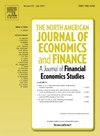气候政策不确定性对金融市场的不对称溢出效应——来自中国的证据
IF 3.9
3区 经济学
Q1 BUSINESS, FINANCE
North American Journal of Economics and Finance
Pub Date : 2025-07-29
DOI:10.1016/j.najef.2025.102513
引用次数: 0
摘要
气候变化是21世纪最大的挑战之一,其不确定性严重影响金融稳定。本文利用2006年10月至2024年8月的数据,运用QVAR-DY溢出指数方法,考察了中国气候政策不确定性对股票、货币、债券、外汇和期货市场的溢出效应。研究发现:(1)极端条件放大了中国气候政策不确定性对金融市场的溢出效应,尤其是在市场繁荣时期。(2)静态分析表明,在正常情况下,债券市场和期货市场的溢出效应最大。在极端情况下,债券市场受影响最大。动态分析表明,在气候事件(哥本哈根峰会、碳峰值和碳中和目标)期间,溢出效应显著增加。在市场低迷时期,债券市场受到的影响最大;在市场繁荣时期,货币市场更容易受到影响。(3)净溢出分析发现,在市场繁荣时期,金融子市场存在显著的正净溢出效应。研究结果为管理气候政策不确定性和减少系统性金融风险提供了指导。本文章由计算机程序翻译,如有差异,请以英文原文为准。
Asymmetric spillovers of climate policy uncertainty on financial markets – Evidence from China
Climate change is one of the greatest challenges of the 21st century, with its uncertainty significantly impacting financial stability. This study examines the spillover effects of China’s climate policy uncertainty on the stock, money, bond, foreign exchange and futures markets, using data from October 2006 to August 2024 and applying the QVAR-DY spillover index method. The findings reveal: (1) Extreme conditions amplify the spillover effects of China’s climate policy uncertainty on financial markets, especially during market booms. (2) The static analysis shows that under normal conditions, the largest spillovers are seen in the bond and futures markets. Under extreme conditions, the bond market is the most affected. Dynamic analysis shows that spillovers increase significantly during climate events (Copenhagen Summit, Carbon Peaking and Carbon Neutrality Goals). During market downturns, the bond market is impacted most; during market booms, the money market is more susceptible. (3) Net spillover analysis finds significant positive net spillovers to financial sub-markets during market booms. The findings guide efforts to manage climate policy uncertainty and reduce systemic financial risks.
求助全文
通过发布文献求助,成功后即可免费获取论文全文。
去求助
来源期刊
CiteScore
7.30
自引率
8.30%
发文量
168
期刊介绍:
The focus of the North-American Journal of Economics and Finance is on the economics of integration of goods, services, financial markets, at both regional and global levels with the role of economic policy in that process playing an important role. Both theoretical and empirical papers are welcome. Empirical and policy-related papers that rely on data and the experiences of countries outside North America are also welcome. Papers should offer concrete lessons about the ongoing process of globalization, or policy implications about how governments, domestic or international institutions, can improve the coordination of their activities. Empirical analysis should be capable of replication. Authors of accepted papers will be encouraged to supply data and computer programs.

 求助内容:
求助内容: 应助结果提醒方式:
应助结果提醒方式:


